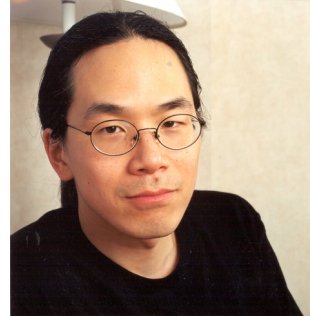 |
|
 |
 |
THE MAGAZINE OF THE SCIENCE FICTION & FANTASY FIELD
 |  |

|
 |

|
Ted Chiang: Science, Language, and Magic |
August 2002 |
|
Ted Chiang was born in Port Jefferson, New York, and graduated from Brown University in Providence RI with a degree in Computer Science. He attended Clarion the same year, and after college took a job in Seattle as a technical writer in the computer industry. Though he's published just eight stories in twelve years, Chiang has won an impressive number of honors: the Campbell New Writer Award in 1992, a Nebula Award for "Tower of Babylon" (1990), another Nebula and the Theodore Sturgeon Memorial Award for "Story of Your Life" (1998), a Sidewise Award for "Seventy-Two Letters" (2000), and the Locus Award this year for "Hell Is the Absence of God" (2001), which is also on the current Hugo ballot. His first collection, Stories of Your Life and Others, which assembles all of his fiction to date and adds one original story, ''Liking What You See: A Documentary'' was published in July. He lives in Bellevue, Washington.
|

Photo by Beth Gwinn
|
Excerpts from the interview:
Everyone refers to science fiction's ability to evoke a sense of wonder. That is definitely a goal of mine, because I remember the sense of wonder I experienced when I read science fiction when I was younger. I would like to be able to evoke that in other people. 'Tower of Babylon' and 'Seventy-Two Letters' both seem to take place in a fantasy universe, yet they ultimately refer to scientific principles in our world. I didn't specifically set out to achieve this effect, but I suspect readers who like those stories like them because the characters achieve an insight at the end of the story. They basically discover for themselves scientific concepts that we're all familiar with in our world, but in this fantasy universe these concepts are novel. It creates some of the feel of the sense of wonder associated with the thrill of discovery one which is harder to achieve in a story set in our universe, where these scientific principles are so familiar. John Crowley has said one of the things the 'Aegypt' books are about is times when the world changes. The insights achieved by the characters in 'Tower of Babylon' and 'Seventy-Two Letters' are likewise insights that will change the worldview of the people in those worlds. They're making conceptual breakthroughs which are new to that universe, but because those breakthroughs are more familiar in our universe, that makes theirs seem more similar to ours, even if only in a metaphorical sense.
*
 I wasn't conscious of a recurring theme in my stories when I was writing them, but if I look for one, I suppose what comes to mind is the notion of an ideal language, the language in which thoughts can be articulated perfectly and things can be described perfectly. Umberto Eco wrote a book called The Search for a Perfect Language in which he talks about the many ways in which people have sought this, in one form or another. They've tried to reconstruct the original language before the Tower of Babel, or the language Adam spoke in the Garden of Eden; there have been attempts to discover the language spoken by angels, the language that perfectly names things. Another way people have sought it is in mathematics or some other logical framework. They've tried to find some mathematical representation which will perfectly describe everything not like the Unified Field Theory, but more broadly, a theoretical framework that will perfectly organize all thought. Another idea was that graphic images might be the basis for a perfect language, because people once thought that Egyptian hieroglyphics or Chinese characters conveyed ideas directly. Nowadays a perfect language is regarded as impossible, because part of the current definition of 'language' is that there's an arbitrary relationship between the symbol and the thing being signified. But I'm still fascinated by the idea of some system of representation in which the relationship is not merely arbitrary but intrinsic. This would, in a sense, map onto both the physical universe and the universe of thought.
I wasn't conscious of a recurring theme in my stories when I was writing them, but if I look for one, I suppose what comes to mind is the notion of an ideal language, the language in which thoughts can be articulated perfectly and things can be described perfectly. Umberto Eco wrote a book called The Search for a Perfect Language in which he talks about the many ways in which people have sought this, in one form or another. They've tried to reconstruct the original language before the Tower of Babel, or the language Adam spoke in the Garden of Eden; there have been attempts to discover the language spoken by angels, the language that perfectly names things. Another way people have sought it is in mathematics or some other logical framework. They've tried to find some mathematical representation which will perfectly describe everything not like the Unified Field Theory, but more broadly, a theoretical framework that will perfectly organize all thought. Another idea was that graphic images might be the basis for a perfect language, because people once thought that Egyptian hieroglyphics or Chinese characters conveyed ideas directly. Nowadays a perfect language is regarded as impossible, because part of the current definition of 'language' is that there's an arbitrary relationship between the symbol and the thing being signified. But I'm still fascinated by the idea of some system of representation in which the relationship is not merely arbitrary but intrinsic. This would, in a sense, map onto both the physical universe and the universe of thought.
The full interview and biographical profile is published in the August 2002 issue of Locus Magazine.
|
 |

|
 |

